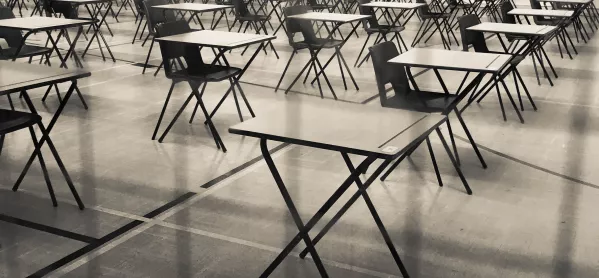‘The exams situation could have been very different’

Setting aside the latest lockdown and the ongoing pressures of remote learning, one of the most significant sources of stress for school students and teachers alike has been the handling of arrangements for assessment and certification for this year.
Whilst the pandemic itself is constantly developing, requiring responses from all branches of the public sector in order for us to find arrangements that can work best given the circumstances, the actions and responses of the Scottish Qualifications Authority (SQA) have consistently been found wanting.
Its recent, ill-timed releases of guidance for collecting evidence for estimated grades at Higher and Advanced Higher have been followed today by an announcement that the deadline for the return of estimates has been pushed forward by three weeks from the end of May to the middle of June.
Background: Date for submitting grades is delayed in Scotland
News: Teachers criticise efforts to ‘replicate’ normal school year
Background: Teachers could get more time to submit estimates
Exclusive: Cancelled exams save SQA almost £20m
Opinion: Exams are fundamentally flawed - so let’s try this
This might, on the face of it, seem like a sensible move, but it has been made in an effort to mitigate the impact of a lockdown that looks likely to last for several more weeks. Concerns had been expressed about the previous deadline long before the latest lockdown, as the timescale required to set, mark, moderate, verify and send the required data to the SQA failed to consider the volume of work required and that teachers would have to complete these tasks in addition to their normal day-to-day work. The new deadline does nothing to address these concerns.
Coronavirus: SQA grades plan ‘risks mental health and wellbeing’
If, as is looking increasingly likely, the lockdown continues beyond mid-February, and students return in March, they will do so only to embark upon a relentless sequence of evidence-gathering exercises (in many cases identical to exams) in order to meet the requirements of the SQA’s guidance. Such an experience for the students involved is unlikely to have a positive impact on their mental health and general wellbeing.
The situation for all involved could have been very different, were it not for the lack of any proactive approaches to the pandemic by the SQA, and its apparent unwillingness to deviate from “business as usual”. It seems unlikely that those at the helm of the SQA gained their positions through their reputations for innovative thinking and disruptive approaches, but there has been a range of workable solutions available.
One very simple solution could have been for ministers to delay the examination diet, moving it from the summer term to the winter term, with the examinations taking place in December. This would have allowed time for students to complete their courses under optimum, face-to-face learning conditions, giving fuller opportunities to complete mandatory coursework to the highest standards.
Such a delay would also have allowed time for improved assessment methods to be developed and delivered (this should, of course, have begun in April 2020) and to conduct a review of the purpose and procedures for assessment in Scotland.
This sort of approach would have helped to create a flexible and responsive system - and one less susceptible in future to the type of disruption caused by the pandemic.
Drew Burrett is a physics teacher in Scotland. He tweets @drewburrett
Register with Tes and you can read two free articles every month plus you'll have access to our range of award-winning newsletters.
Keep reading with our special offer!
You’ve reached your limit of free articles this month.
- Unlimited access to all Tes magazine content
- Save your favourite articles and gift them to your colleagues
- Exclusive subscriber-only stories
- Over 200,000 archived articles
- Unlimited access to all Tes magazine content
- Save your favourite articles and gift them to your colleagues
- Exclusive subscriber-only stories
- Over 200,000 archived articles